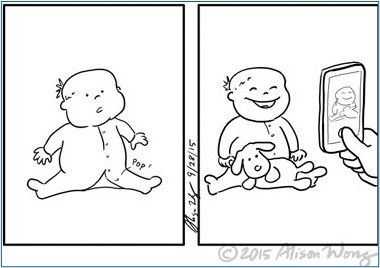The Rise of Social Media (Technology & Faith, Part 2)
- Timothy Kernc
- Apr 18, 2025
- 9 min read
Updated: Apr 28, 2025
Everyone I know... well, at least everyone under a certain age... uses social media.

The Big Four (as I call them)-- Facebook, Instagram, X (formerly Twitter), and YouTube-- did not exist 25 years ago but, today, they have become so ubiquitous that it's hard to imagine a world without them. Their icons adorn web-sites (such as this one), are embedded in emails from reputable organizations, including churches, and have permeated all aspects of modern life. Companies and sports franchises put out major announcements (formerly referred to as press releases) via X (Twitter). Small business-owners generate revenues via Facebook Marketplace. Celebrities and famous personalities tweet their opinions on every topic under the sun. I don't think it's possible to get a job without a Facebook page and/or Linked-In profile.

It feels like everyone, including the family pet, has their own Facebook page.

New Technologies create New Behaviors
People live their lives on social media. Every thought is typed and shared… every moment captured with a smart-phone camera… every selfie taken posted. (At least, the good ones with eyes open-- not mid-blink.) Everything is posted about and available online. I'm just grateful the phenomenon of taking a photo of some great meal you're having has finally seemed to die off. But, for the younger generation especially, it's gotten to where if an experience isn't posted on Facebook... it's like it never happened.

Gone are the days of dusting off the family photo-album to look at pictures from years ago. Entire histories of young people born since 2005 are available for the world to see on Facebook. My cousin created Facebook pages for her children before they were born. Kids are growing up these days mastering the art of how to interrupt what they're doing, pose for a brief picture taken by Mom on her phone, and then return to what they were doing.

I marvel at the changes happening under our noses since the birth of social media. They happen so quickly, these changes, they become part of our collective behavior before we even realize it. And in no time we've forgotten what behavioral norms were before the technology existed. Imagine getting in a time-machine and going back to 1984 to convince President Reagan that the world wants to know his every thought daily-- whether on public policy or some cultural event. And that all he has to do is type those thoughts in short staccato sentences with his thumbs and, with the press of a button, they’re sent out and made available to the public... forever... poor grammar, typos and all. I wonder what Reagan's response would've been if given that sneak peek of the world of 2025. Probably something like the executives at Xerox whose in-house Palo Alto Research Center (PARC) invented the mouse but failed to see how the mouse, coupled with GUI (Graphical User Interfaces), would revolutionize the home-computer market. (Here's a brief version of this story: Execs asleep in the lounge while Jobs and Gates stole Xerox’s TV.)
Technology has changed our behaviors. People are spending more time with their phones while indisposed. (See the humorous bit from Anjela Johnson that I posted in Part 1 of this blog: https://www.tiktok.com/@anjelahjohnson/video/7229747973012360490.)
During his first term, I remember thinking that President Trump's Twitter posts ("tweets") seemed to be the product of someone who couldn't sleep or was posting (often between 1:00am and 4:00am) from the bathroom. But at least Trump knew how to use Twitter. Legend has it that Biden once asked his Press Secretary, "What's a tweet?"
Are you watching YouTube or is YouTube watching you?
Could our grandparents ever have imagined something like YouTube? It is our modern era’s network television without the networks. But it’s clearly more “feature-rich” than watching the latest sitcom or drama. The advertising is more targeted and disconcertingly enticing. Ever wonder why the ads that pop-up when you’re watching a YouTube video seem like something you might be interested in? Analytics, my friend. “They” (Google) know what you like to watch and what you're interested in. Probably more than you do.
We’ve become a generation waiting for the “SKIP” button to appear to make ads disappear and quickly get back to watching what we clicked on to begin with, whether it's how to install a screen-door, get advice on how to lose weight and get in shape, listen to the sound of the surf crashing against some sun-drenched beach in an exotic locale or hear some guy's list of "The Top 10 Unknown Foreign Movies about America." How did we ever function without YouTube?
The Social Effects of Social Media
The amount of time people spend on social media tends to vary widely depending upon their age, with people under 20 spending four times as much time as people over 40.
A 2011 report by the American Academy of Pediatrics (AAP) identifies a phenomenon
known as Facebook depression which may be triggered “when preteens and teens spend
a great deal of time on social media sites, such as Facebook, and then begin to exhibit
classic symptoms of depression." (https://pmc.ncbi.nlm.nih.gov/articles/PMC9707397/)
There's a very helpful guide for parents that was published more recently (in January 2024): "How Social Media Affects Your Teen’s Mental Health: A Parent’s Guide."
In the spring of 2023, United States Surgeon General Vivek Murthy, MD, MBA, released an advisory called Social Media and Youth Mental Health, in which he says there is growing evidence that social media is causing harm to young people’s mental health. Soon after, the American Psychological Association (APA) issued its own health advisory. A year later, in
June 2024, Dr. Murthy called for a surgeon general’s warning label on social media platforms, which would require an act of Congress to implement.

If you're the parent of a teenager and don't want to take the time to read the Parent's Guide published by Yale Medicine, then I highly recommend watching the two and a half minute short film on Social Media Addiction available (where else?) on YouTube. (Ironic, isn't it?) In fact, I think it should be mandatory for any parent of a teen that has recently been given a smart-phone. In a style reminiscent of Walt Disney's first animated film, Steamboat Willie, this short film is a great "cinematic representation" of the effects social media is having on our youth. If this short raises your awareness and causes you a higher degree of concern... I think that's a good thing.
There's also a great documentary on this topic entitled Captivated, produced by ReelCast Productions and directed by Collin Gunn & Phillip Telfer. It's both a cautionary tale of the effects media addiction is having on our youth and a "call to arms" for parents. If you're a parent with young children who will be more and more exposed to social media as they grow up... check it out. You'll be glad you did.
According to a study published in 2022 entitled "Loneliness and psychological distress before and during the COVID-19 pandemic," social media can have terrible consequences on people who spend too much time absorbed in them.
Despite their increasing ubiquity in people's lives and the incredible advantages
they offer to instantly interact with people, an increasing number of studies have
linked social media use to negative mental health consequences, such as suicidality, loneliness, and anxiety.
So what is a person to make of all those social media posts available for swiping and clicking? Do social media platforms truly create a sense of community? Or, as I suspect, are they merely creating a "false" sense of community based on the facade we all present via their platform. (We all post what we want the world to know about us, not who we really are.)
Does social media help me to glorify Jesus in how I live my life?
What Would Jesus Do?
As I'm prone to do in times of conflict and questioning, I asked the tried-and-true litmus test question: "WWJD?" And then I went a step further and wondered if Jesus were walking the earth today, would He be on Facebook? And what might his FB page look like?
Well... to my surprise, I learned that He is on Facebook! But I was disappointed to see that he only has a little over a million followers. His site, unfortunately for me, is in Spanish... so I had to copy His posts into a Google translator to understand them.
Our Savior's Facebook page is obviously managed by a Spanish-speaking individual and has the potential to be blasphemous, but I found the page to be uplifting and encouraging. I could think of no negative psychological ramifications of visiting to this site other than naively believing it's truly Jesus who is updating it. The AI-generated reels of Jesus speaking directly to me (the viewer) were both captivating and unnerving. In one of them he says: "Pray in faith and tell God what worries you." In another, he says: "You should always speak to God."

Obviously, it's not really Jesus updating this Facebook page. But I would imagine there are people whose primary language is Spanish that check the site regularly for reasons similar to why I read a daily devotion: to keep my priority seeking first His kingdom and His righteousness, as well as to receive daily encouragement.
Jesus has an Instagram page, too. (And it's in English!) Although it's obviously managed by someone who is not our Savior, it's got a lot of great photos of signs and slogans that feel simple because they are. It's funny how the Truth is often so much less complicated than the axel of reality we so easily wrap our chains around.
Who doesn't like an uplifting slogan now and again?

If I could just get some clear direction from Jesus on how to navigate the confusing new social behaviors that have come about since the advent of Facebook.
I still haven’t figured out the proper protocol for Friend requests. Can I send a friend request to someone I don’t really know but would like to? (Like say, Eric Metaxas or Pastor Rick Warren?) Or should I have had a phone or text conversation, first? What about someone I just met? And how should I feel if I send a request to someone but they never accepted it. Is it because they're not checking their social media... they're just slow to respond… or maybe, they don’t really want to be my “friend?” And if it’s my child… shouldn’t there be a Parent Request instead of a Friend request? I don’t really think of myself as my child’s “friend.” But it's how I can know what's happening in their life... at least, according to what they post on Facebook. (I’m still waiting for my daughter to accept a Friend request I sent her in 2017.) Apparently, she doesn’t want to be my friend.
Social media, like any other life-impacting technology, is neither inherently "good" nor "evil." It's how we use it that makes it a positive or negative... how we behave while using the tool that matters. Just like the automobile, television, computer, smart-phone, and a thousand other technologies that permeate our lives in the 21st century... the question to ask is: are we living out Jesus' commands when using these tools? Or are we so distracted by the medium that we've forgotten how we should be serving and what we should be spending our time on?
Those who consider themselves religious and yet do not keep a tight
rein on their tongues deceive themselves, and their religion is worthless.
Religion that God our Father accepts as pure and faultless is this: to look
after orphans and widows in their distress and to keep oneself from being
polluted by the world. James 1: 26-27 (NIV)
Social media is addictive and can consume us so much that we miss what's going on in the world around us.

Plus, let's not forget... real connection can only come in-person, where all five senses and our emotional core (soul) can be interacted with.

Social media isn’t going away anytime soon. (Unless we're talking about MySpace.com.) So you might as well accept all those Friend Requests, learn how to take a good Selfie and get to posting. The more followers you have the more fulfilled you will feel. (Will you though?) The world is waiting. (No, it’s not.) Everyone wants to hear what’s going on with you and what you have to say. (Do they really?) And, most importantly, they want to see what you look like. (Well, that is true.)

At the risk of sounding like I'm making a sales pitch, we'd be grateful if you checked out our Facebook, Instagram and YouTube pages. Our hope & desire is that we are using these social media sites to encourage believers and point people to Jesus.
Reference Material:
Movie Recommendation:












Thanks for this!